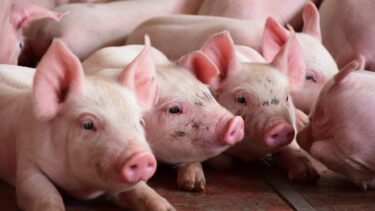How to improve pig welfare through proper nutrition
In today’s agricultural landscape, animal welfare is a growing concern driven by consumer awareness about food sourcing. While managerial efforts are crucial, the significance of feed in ensuring the well-being of pigs is often underestimated. In this article, Earlyfeed specialists at Agrifirm explore the critical role of nutrition in pig health and happiness, particularly during stressful phases like weaning. By understanding how proper nutrition can profoundly impact pig welfare, we shed light on the importance of selecting the right feed.
Feed what they need
Tailoring feed to meet the specific nutritional needs of pigs is paramount for their well-being. Piglets, especially, require adequate energy and protein to support their growth potential. During the crucial weaning period, a low-protein diet has proven effective. However, it’s crucial to supplement this low protein content with essential amino acids to fulfill the piglet’s nutritional requirements and mitigate issues such as tail-biting behavior. To address this, in a recent study, two strategies were evaluated: supplementation with amino acids and environmental enrichment. While the enrichment group showed no significant impact on tail-biting frequency, the group supplemented with amino acids demonstrated clear improvement.
Moreover, it’s essential to ensure sufficient energy levels in the diet. Research shows that lower energy levels in the diet may contribute to an increase in aggressive behavior among pigs, leading to the necessity of removing affected animals from the herd.
Importance of fibers
Introducing fibers into pig diets promotes satiety, as it increases chewing behavior and gut filling, leading to a sense of fullness. Fermentable fibers in particular release short-chain fatty acids (SCFA) in the gut, reduces blood sugar fluctuations, enhancing long-term satisfaction and reduces aggressive behavior among pigs.
Essential micronutrients during stress
During stressful periods, pigs excrete higher amounts of magnesium and sodium. Supplementing these micronutrients, along with tryptophane —an amino acid precursor to serotonin — can support mood regulation and overall well-being.
Harnessing the gut-brain axis
The gut-brain axis, a complex communication pathway between gut microbiota, intestinal health, and the brain, plays a crucial role in pig welfare. Disturbances in gut microbiota composition, often triggered by stressors such as dietary changes or environmental challenges, can lead to behavioral changes and mood alterations. Scientific study results increasingly emphasize the importance of optimizing gut health through dietary interventions.
Promoting gut health
Given the complex relationship between gut health and the pig’s well-being, optimizing the gut microbiota through dietary interventions and management practices can significantly enhance pig welfare. Strategies like among others medium-chain fatty acids (MCFA) administration, probiotic supplementation, and inclusion of prebiotics can optimize the gut microbiome and overall gut health. These interventions enhance behavioral resilience and stress coping mechanisms in pigs.
Conclusion: welfare – like love – goes through the stomach
While managerial interventions are important, tailored nutrition plays a vital role in enhancing pig welfare, especially during stressful phases like weaning. By customizing feed, integrating fibers and addressing nutrient imbalances, we can optimize pig welfare and align with consumer expectations for ethical farming practices, ultimately enhancing productivity and sustainability in the swine industry.
Earlyfeed, Royal Agrifirm Group’s young animal nutrition brand, offers innovative solutions and expert advice to maximize animals’ performance, health, and well-being right from the start. The goal: to support farmers worldwide with adequate feeding strategies that result in happy, healthy and resilient animals.
This contact was suggested based on the location you are browsing from. You can of course also consult our other contacts and locations here.

